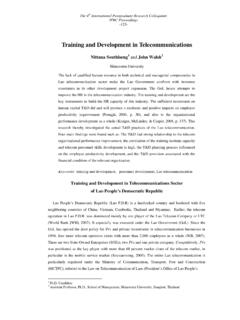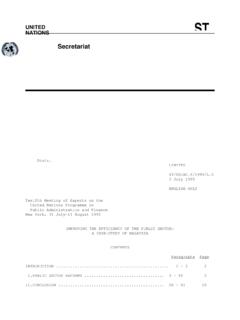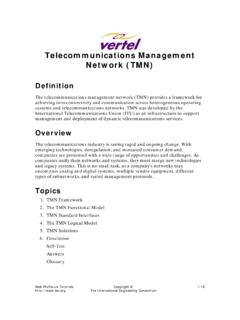Transcription of TABLE OF CONTENTS - Liberia Telecommunications Authority
1 TABLE OF CONTENTS INTRODUCTION 3 Liberia S VISION FOR ICT 4 Telecommunications AND ICT DEVELOPMENT 4 Telecommunications Objectives 5 ICT Objectives 6 NATIONAL PRIORITIES IN ICT SECTOR 7 SECTOR ORGANIZATIONS 10 MINISTRY OF POSTS & Telecommunications (MP&T) 10 ICT Legal and Regulatory Framework 10 2 . National Budget 11 Networks Deployment and Accessibility 11 Career Employment and Capacity Building 11 Liberia Telecommunications Authority (LTA) 11 THE NATIONAL OPERATOR (LTC / Libtelco)
2 12 Fee Waivers and Duty Free 14 SERVICE PROVIDERS/ OPERATORS 14 MARKET STRUCTURES 15 Operations & Services 15 Spectrum & Frequency Management 15 Granting Licenses 17 Transparent Procurement Procedures 18 Direct Applications Procedures 18 Financial Obligations 18 Investment Incentives 18 National Backbone Infrastructure and Global Connectivity 19 REGULATIONS 22 National Numbering Plan 22 National Numbering Administration 22 Numbering Plan Designations 22 Interconnection Services 23 Quality of Service 24 National Emergency & Security 26 Network and Equipment Type approvals 27 Co-Location 27 Rights-of-Way 28 Dispute Resolution 28 UNIVERSAL ACCESS NATIONAL PENETRATION AND GLOBAL CONNECTIVITY 29 Market Penetration and Teledensity 29 Universal Access Policy 29 Universal Service Policy 29 Universal Access Fund (UAF)
3 29 ICT GOVERNANCE STRUCTURES 30 ICT POLICY, STRATEGIES AND E-FUNCTIONS 30 Government and Global Deliverable Objectives: WSIS and MDG 30 Pursuing World Summit on Information Society (WSIS) as a Priority Objective 30 Pursuing Millennium Development Goals (MDG) as a Priority Objective 31 National ICT Governing Board 31 ICT Champions and the CIO Governing Council 31 Chief Information Officer (CIO) 31 2 Functions of the CIO 32 Cyber Security 33 Cyber Crimes 34 Method of Proof 34 E-Legislation 34 Internet Service Providers 34 Internet Telecenters 34 Electronic Data Services 35 E-Services 35 E-Services Portal 35 Salient Features of e-Services Vision 35 E-Procurement 35 E-Government 36 E-Commerce 38 E-Health 38 E-Agriculture 38 E-Education 39 E-Security 40 Gender.
4 Youth and People with Disabilities 40 MONITORING AND EVALUATION 42 Universal Access Governing Board 42 Universal Access Governing Board Composition 42 Universal Access Implementation Committee 42 Program Management Office (PMO) 43 Stakeholders Annual Forum 43 DEFINITIONS 44 APPENDIX A 49 DESCRIPTION OF CYBERCRIMES INCLUDED IN ECOWAS CYBERCRIMES DIRECTIVES ..49 3 PART I INTRODUCTION This document presents the Government of Liberia s Policy for the Telecommunications and Information Communications Technology (ICT) sectors.
5 The Government of Liberia (GoL) understands the important role that Telecommunications and ICT play in the Poverty Reduction Strategy (PRS) policy, which is built on the following four pillars i. Enhancing National Security ii. Strengthening Governance & Rule of Law iii. Revitalizing the Economy iv. Rehabilitating Infrastructure and Delivering Basic Services Liberia s ability to accelerate its economic development process, gain global competitiveness and improve the well being of its people depends on the extent to which it can develop, use, and sell Telecommunications and ICT services in one form or another.
6 The goal is to integrate Telecommunications and ICT services into overall developmental objectives, priorities, and programs. Our school systems, health programs, commercial, national security and government programs including procurement activities shall be transformed using ICT as the effective platform to ensure transparency, efficiency and productivity. ICT shall facilitate the outcomes of the National PRS objectives to accelerate economic growth for sustainable national development.
7 The GoL has embarked on setting a national agenda that involves the Telecommunications and ICT sectors to better the lives of its citizens and alleviate poverty through inducing economic activities, improving educational systems and ensuring that citizens are stakeholders in the national policy agenda. This document outlines the strategies to continue liberalization of the Telecommunications sector and establish ICT partnerships as a means to improve services delivery and open up new opportunities.
8 The Telecommunications ACT of 2007 redefined the functions and responsibilities of government agencies including the Ministry of Posts and Telecommunications , the Liberia Telecommunications Authority and the designated National Operator. High level issues of policy-making, regulation enforcements, liberalization, fair competition, universal access, national security and standardization, to name a few, are addressed. The national ICT Policy is to ensure that services and systems are people-centered, universally accessible and cost-effective.
9 The government s role is to establish a legal regulatory framework and institutional mechanisms to guide the activities of all stakeholders. In summary, these policies are intended to achieve the modernization and rapid expansion of the Telecommunications network and communication systems. The goals are to increase productivity; enhance information sharing; and become global stakeholders in the Telecommunications and ICT environment. The dynamic nature of modern technology in Telecommunications and ICT makes it compelling to periodically review and set new policy guidelines.
10 The policy objective shall be set for five years (2010 2015) in support of the World Summit on Information Society (WSIS) target to connect the world by 2015, of which the government s PRS makes up the first two years. 4 Liberia S VISION FOR ICT The Government of Liberia s vision for the ICT and telecommunication Sector is to promote infrastructure development, integrate information and communications technologies throughout the society to enhance the process of national reform.






